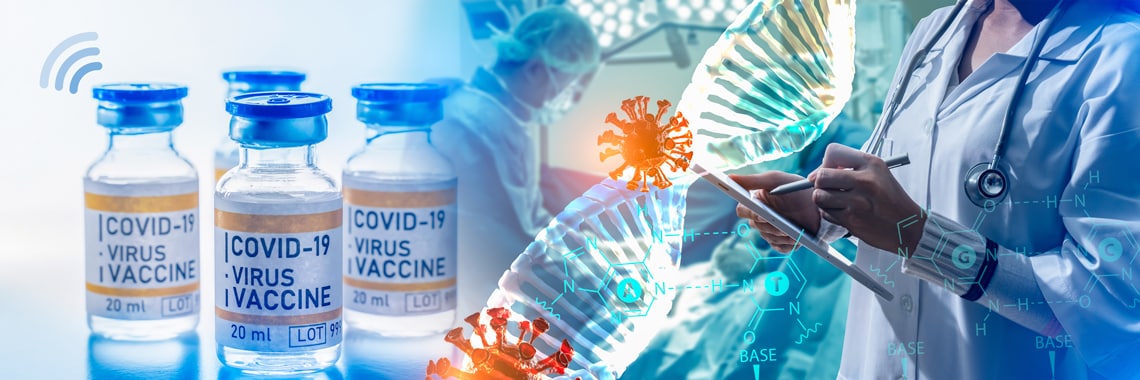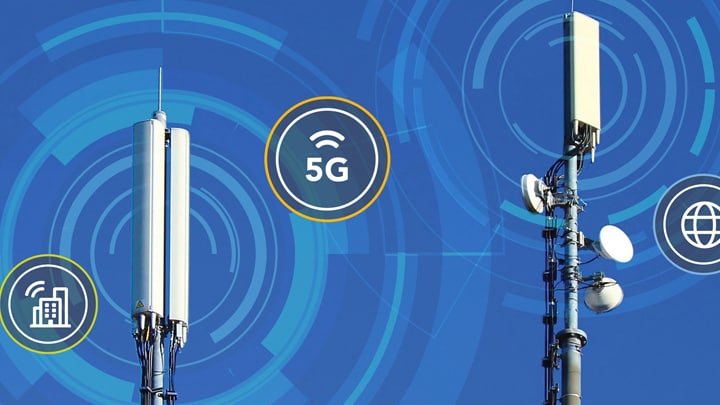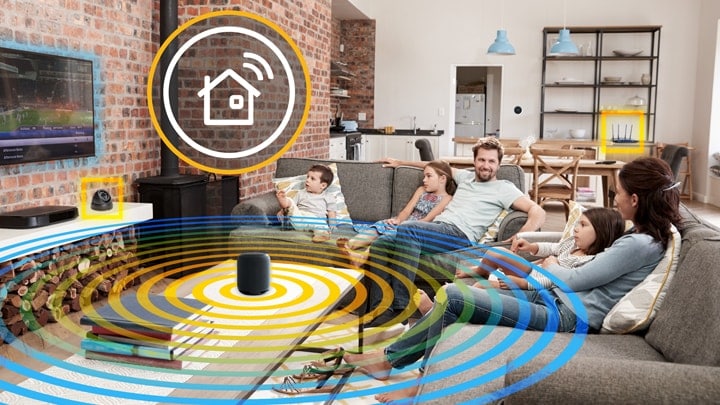As efforts get underway to vaccinate people around the world, so as to contain the COVID-19 pandemic, pharmaceutical companies and national health authorities are looking for ways to ensure that delicate vaccines remain safe while in transit and are ready to use when they arrive at their intended destination.
NFC and High-Frequency (HF) RFID tags, which are small, mass-produced electronic tags used to verify authenticity and confirm safe handling, can help protect vaccine deliveries. NFC security tags can help on another front, too, because they can be used to issue verifiable vaccination certificates.
How the Tags Work
NFC and HF RFID tags can be affixed to the transport packing boxes or trays that carry vaccine vials, and when embedded in plastic buttons, can be attached to the seals of the actual vaccine vials, making it possible to track shipments and verify their origins. Both types of NFC and HF operate at a frequency band of 13.56 MHz but support different standards and read ranges to harness multiple applications. NFC tags allow read ranges in close proximity of a few centimeters and can be read with standard NFC phones. HF RFID tags allow vicinity read ranges of up to 1.5m using long-range readers but include NFC phone compatibility.

HF RFID and NFC for Product and Supply-Chain Protection
High-demand, expensive medications, such as antibiotics, cancer medicines, vaccines, and antivirals have, for some time now, been common targets for counterfeiting, tampering and grey-market diversion.
Even before the pandemic, the World Health Organization (WHO) and the Organization for Economic Cooperation and Development (OECD) estimated that around 10% of all medicines sold worldwide were counterfeits. In their November 2020 report, Europol found that the distribution of substandard and counterfeit pharmaceutical products, including COVID-19 vaccines, remained a consistent criminal activity related to the pandemic. These fake vaccines can circulate on illicit markets and may be introduced to legal markets for distribution.
HF RFID and NFC tags can help reduce the risk of counterfeiting and product diversion into unauthorized channels by enabling secure product authentication and improved traceability and accountability in the supply chain at the box and item levels. Electronically tamper-evident seals and labels can be attached to vaccine packaging at the point of manufacture to protect against unauthorized opening. Labels come with their own unique ID can be assigned to specific distributors and locations, and can report their origin and intended destination at any point in the supply chain.
HF RFID tags based on ISO/IEC 15693 can reliably track, trace and authenticate vaccine products through the supply chain, with item-level accuracy. The technology uniquely identifies each item, even when multiple items pass a reading location simultaneously (anti-collision), and it securely captures data without line of sight, thus making it easier and quicker to move goods to the right place in the channel. The technology can help detect stock losses, can identify if returns were originally shipped from a particular manufacturer, and can help prevent grey-market diversion. HF can also track batch numbers and expiration dates.
NFC tags based on ISO/IEC 14443, as well as HF RFID tags through their use of NFC protocol, can also support item-level authentication, using mobile phones. Due to the high popularity of NFC-enabled smartphones – about 2 billion NFC phones are in use globally today – this form of authentication incurs no costs for special readers and can be performed by anyone involved in the process at any time. Simply tapping the phone to the NFC tag with an NFC-enabled smartphone lets a government inspector, warehouse worker, distributor or healthcare provider verify authenticity and see where a product or batch is meant to go. Security tag solutions, such as NXP NTAG DNA or ICODE DNA , which have built-in encryption features, offer high protection against attempted fraud.
NFC for Safe Handling
Tags with electronic tamper evidence are seeing increased demand, as they are designed to detect changes in opening status. This makes it easy to detect if a shipment product package has been interfered with while in transit or storage. The NXP NTAG TagTamper tags, for example, include a conductive tamper loop that detects opening and irreversibly records the event upon a tag readout. This feature helps remove doubts about whether a given package has been opened before arrival or use, and if the vaccines inside have been diluted, refilled or otherwise substituted from the original.
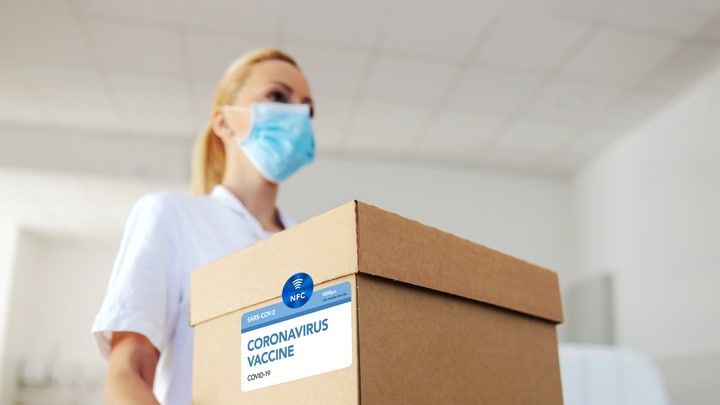
Many commonly used vaccines and medications, including insulin, are temperature-sensitive and need to be kept within a given temperature range while in transit or storage, or they can’t be used. COVID-19 vaccines fall into this category, and need to be kept below a certain temperature to remain viable.
NFC tags equipped with temperature monitoring features can be used to track the vaccine’s storage environment and indicate if the shipment has been exposed to out-of-range temperatures. NFC tags that can measure and log temperatures can be attached to secondary packaging, such as a transport carton, a box, or tray that contains vials.
The NXP NTAG SmartSensor , for instance, is a temperature logger that operates from -40 to +85 °C, and has a large non-volatile memory for recording temperature readings. The tag can act as a smart monitor, using a pre-programmed stability budget to indicate if vaccines have been stored properly and are still safe to use. Security features can protect sensor data from outside manipulation, prevent uploads of false or compromised data, and safeguard against unauthorized access to stored temperature readings.
NFC for Verifiable Vaccination Certificates
Vaccination certificates, which are documents that establish that a person has been inoculated against a particular viral or bacterial disease, have been used for nearly 100 years to limit the spread of vaccine-preventable diseases, including yellow fever, measles and meningitis.
With COVID-19, vaccination certificates are being considered by governments and businesses as the basis for doing things like re-opening borders, returning to in-class learning and in-office work, and allowing people to gather in public spaces. However, paper certificates could be subject to fraudulent activities.
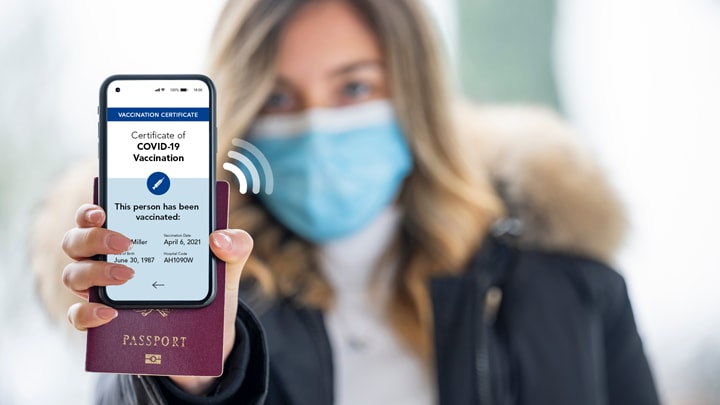
Contactless NFC tags are a secure yet easy-to-deploy solution for issuing verifiable vaccination certificates. The NFC tag can take the form of a sticker, which can be attached to an existing ID or vaccination card, or it can be issued as a standalone COVID-19 vaccination card. The stickers can be read by any NFC-enabled smartphone, so it’s easy to set up vaccination status updates by issuing entities such as hospitals or general practitioners. Vaccination records linked to proof of ownership can then be verified by inspectors, at just about any place where people need to demonstrate their immunity status, from border crossings, schools, and offices to entertainment venues, sporting events, hotels, and so on.
The NXP NTAG 424 DNA , a CC EAL-certified security chip with individual identifier, secret keys and enhanced privacy features, is well suited for use with verifiable vaccination documents, as each tap with a smartphone or other NFC device generates a unique, secure and privacy-protected transaction. The AES standard-based cryptographic code changes with every use, enabling each tap to be individually authenticated. The technology also enables additional secured on-chip data storage. Verifiable NFC vaccination certificates based on NXP DNA security technology provide three immediate benefits: authenticity, privacy protection and proof of ownership.
Pharmaceutical companies can support this process, by preparing uniquely verifiable immunity stickers and shipping them with the vaccines, so doctors, clinics and hospitals receive ready-to-use stickers along with ready-to-use vaccines. National health administrators, and possibly pharma companies, can subsequently be responsible for generating secure certificates, upon receipt of data related to the vaccine, such as date and place of vaccination and hashed patient information. The request for such a certificate comes from a medical professional at the point of care, using a smartphone loaded with a mobile app. The patient, having received their shot, then receives a sticker or card already loaded with their certificate. An inspector can then tap the certificate with their NFC-enabled smartphone, equipped with a verifier app, to check authenticity and a person’s immunity status. All vaccination details are digitalized, encrypted, and linked to a patient’s identity – without exposure of any personal data. This is to help ensure that health credentials are up to date and comply with privacy requirements, such as GDPR or HIPAA.
Conclusion
As we begin to combat the pandemic with rapid vaccination on a global scale, pharmaceutical companies have an important role to play when it comes to protecting the supply chain and successfully delivering ready-to-use immunizations. NFC and HF RFID tags, with their ability to verify vaccine authenticity, report shipment status in real time, and help ensure safe storage and handling, support to bring vaccines to patients in a safe and efficient way. At the same time, NFC security tags can help confirm that inoculations have taken place, with verifiable vaccination certificates that securely and privately report vaccination status.
Wireless Edge Technologies Are Shaping the Medical Supply Chains of Tomorrow
Read on our recent blog to find out more on how wireless-enabled medical supply chains are essential for rapid, secure and safe delivery of authentic vaccines and other medical supplies.

